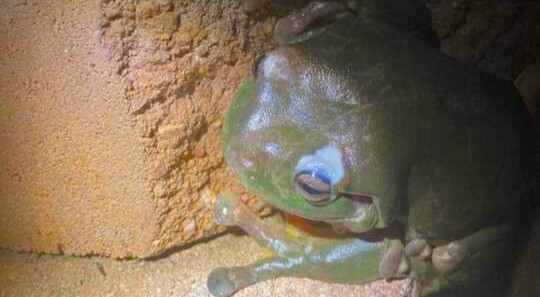The Invasive Species Council has welcomed the Queensland government’s proposal to restrict Amazon frogbit under the state’s biosecurity laws but says Queensland should seize the opportunity to stop history repeating itself with other invasive aquatic weeds.
Under the proposal, Amazon frogbit would be banned from sale, trade or release in Queensland – a move that would finally end the widespread sale of one of Australia’s most notorious aquarium and pond plants.
‘Listing Amazon frogbit will stop one of Queensland’s worst aquatic weeds from spreading further – but it’s critical the government prevents loopholes which would allow the aquatic industry to replace one weed with another,’ Invasive Species Council Advocacy Manager Reece Pianta said.
‘We’ve seen this pattern before: a harmful species is banned and retailers pivot to a near-identical plant with the same invasive traits. Without careful regulation, the problem simply mutates. Spongeplant – also called American frogbit, is one such risk.
‘Fortunately, spongeplant is not yet in Queensland – so we have a chance to prevent the next aquatic invader. Ultimately, what we need is a ‘white-list’ approach that only allows safe, non-invasive water plants to be traded.
‘Government must make it easy for hobbyists and retailers to do the right thing – and impossible for risky species to enter the trade in the first place.
‘We can protect our waterways, farmers and native wildlife by closing these loopholes now, before spongeplant and other look-alike species enter, escape and establish.’
The Invasive Species Council is urging the Queensland government to:
- Finalise the Amazon frogbit listing without delay.
- Extend the same restrictions to functionally similar invasive species such as spongeplant (Limnobium spongia).
- Move toward a white-list system for aquatic plants sold in Queensland.
‘Queensland has an opportunity to lead the country by closing the revolving door of invasive plant sales,’ Mr Pianta said.
‘Strong, precautionary regulation now will save millions in future control costs – and spare our rivers, creeks and wetlands from another wave of preventable damage.’
Background:
- Biosecurity Queensland is currently undergoing a review of the prohibited and restricted matter lists, where it is considering the addition of new species under the state’s Biosecurity Act 2014 and Biosecurity Regulation 2016.
- Amazon frogbit is an invasive weed that can block irrigation infrastructure and degrade waterways. Despite this, it is known to be kept and traded in Queensland as an aquarium and ornamental pond plant.
- Several local governments have locally declared this species as a weed to manage the biosecurity risk. It is proposed to list Amazon frogbit as restricted matter and assign category 3 and 5.
- These categories mean Amazon frogbit would not be able to be kept or sold, traded or released into the environment and would need to be disposed of in line with biosecurity laws.
- Listing Amazon frogbit at the state level would prevent further distribution and establishment across Queensland and simplify compliance by ensuring consistent regulation between local government areas. There are native aquarium plant alternatives to Amazon frogbit, including native lilies.
- It has become established in waterways and wetlands and is now a major weed in Queensland and New South Wales and was recently detected in Darwin.
- Frogbit spreads rapidly creating an impenetrable layer on the surface of water. This causes a choking effect impacting aquatic and bird life degrading water quality from decomposing weed matter. Tourism and recreation are also affected along with irrigation, power and transport infrastructure.
- The sale and trade of frogbit is prohibited under New South Wales law and in some Queensland local government areas. It is not prohibited in Queensland Government regulations.
- Spongeplant or American Frogbit (Limnobium spongia) is in the same genus as Amazon Frogbit and would be an obvious choice to replace frogbit in the retail and online ornamental pond and aquarium trade.
Photo credit: Terry Inkson.







